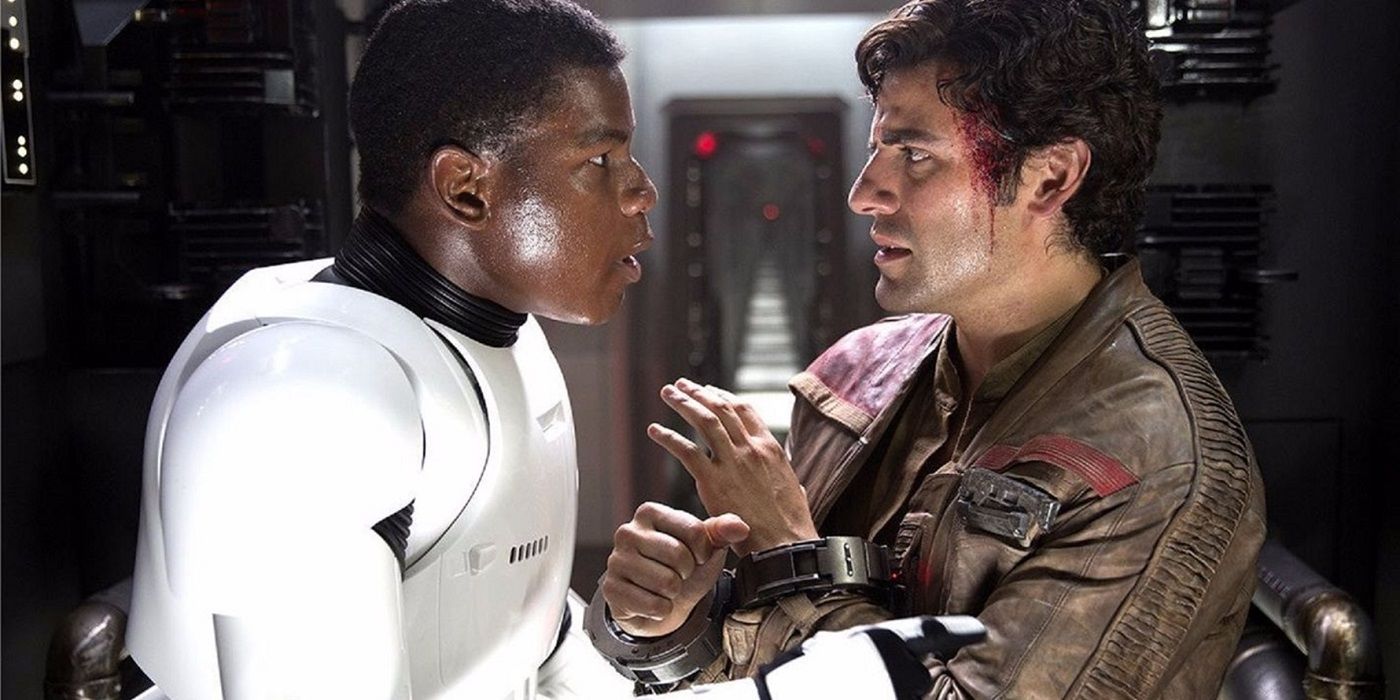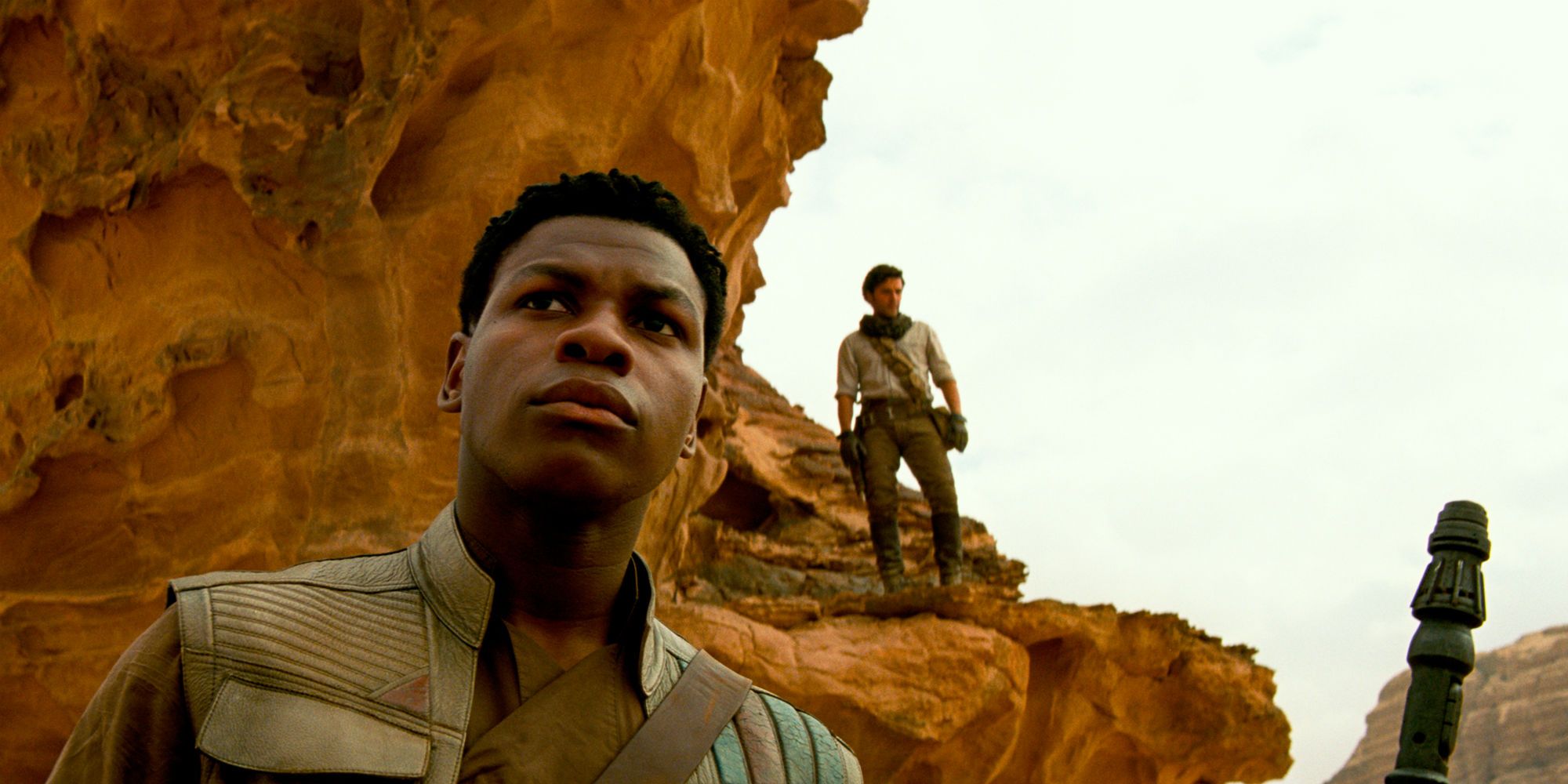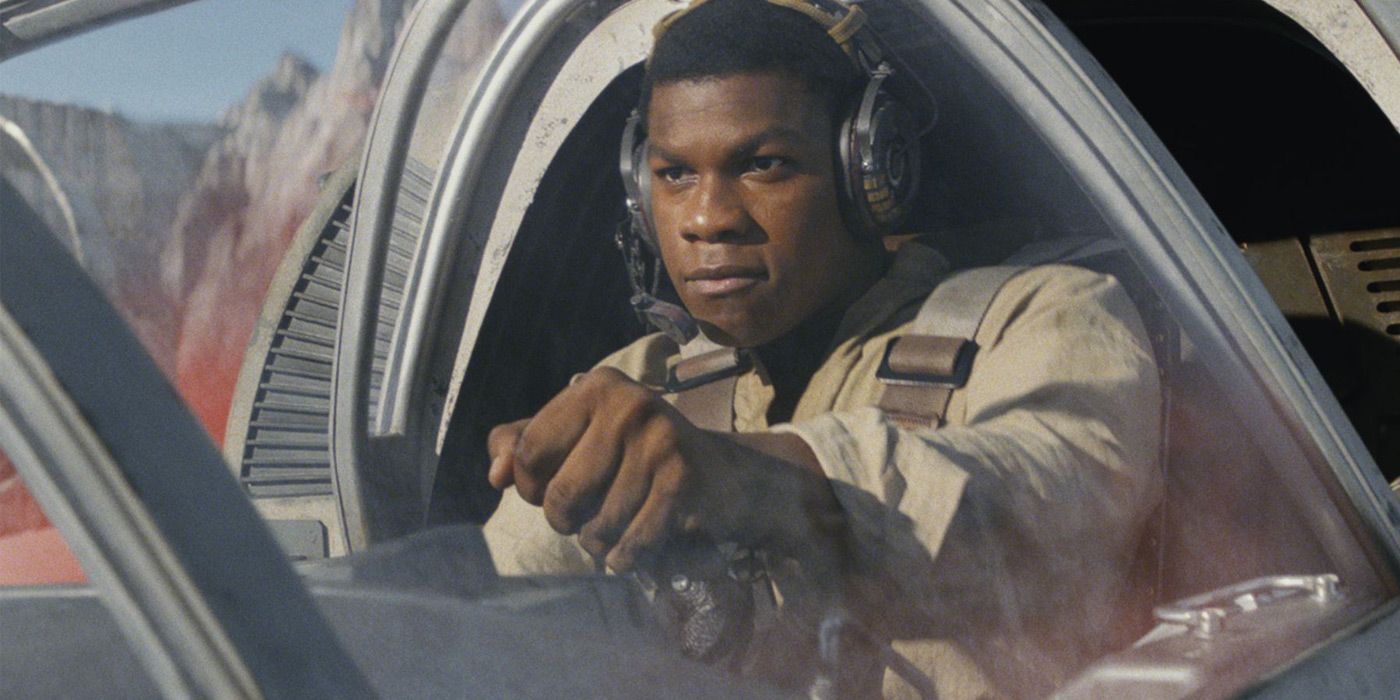
Despite being a consistent main character throughout the Star Wars sequel trilogy, Star Wars: The Last Jedi is the only movie that gave John Boyega's Finn a proper storyline. Introduced in 2015's Star Wars: The Force Awakens, Finn is part of the sequel trilogy's core trio, alongside the talented yet reckless Resistance pilot Poe Dameron and the scrappy scavenger Rey, who turns out to be Force-sensitive and a potential Jedi. Finn is portrayed as a former stormtrooper who, after witnessing the brutality of the First Order as they wipe out a small village on Jakku, decides to defect from the organization and forge his own path.
Throughout the sequel trilogy, Finn struggles with his individuality and free will after leaving the First Order, especially with the knowledge that he was kidnapped at birth and never knew his real family. However, through his adventures with the Resistance he comes to find a place where he feels like he belongs, specifically with the trio of friends that he comes to realize is his new family.
While Boyega gives an inspired performance as Finn throughout all three films, his character is frequently failed by the writing in both Star Wars: The Force Awakens and Star Wars: The Rise of Skywalker. Neither movie really knows how to approach or develop Finn outside of the basic characteristics he was introduced with. However, Rian Johnson's 2017 sequel, The Last Jedi, actually gives Finn some much needed character development. Despite the movie's divisive nature among fans, it is the first time that Finn is fully realized as an individual, and the first time that he's treated like a three-dimensional character.

Finn's first debuted in The Force Awakens, and he was used a clever way to both introduce a protagonist unlike any fans had seen before and provide inside context on the galaxy's newest threat, the First Order. When audiences meet Finn at the beginning of Star Wars: The Force Awakens, he's accompanying Kylo Ren to a small village on Jakku, which the First Order suddenly razes to the ground when Kylo doesn't get what he's looking for. It's a harrowing scene, and the moment that sews the first seeds of doubt into Finn's mind. So when the character hops into an escape pod, helping to free the newly captured Resistance pilot Poe, audience's immediately root for him.
The film's marketing gave a distinct emphasis to Finn's character, featuring advertisements and trailers in which he's seen to be using Anakin Skywalker's lightsaber, something he does do in the film. John Boyega once recalled during an interview the moment he discovered he got the part, in which JJ Abrams told him, "John, you're the new star of Star Wars." And looking at the way Lucasfilm built up the promotional material for The Force Awakens, it seemed as if everyone was expecting for Finn to be the new main hero of the saga, a former stormtrooper turned Jedi.
However, that was ultimately not the case. Instead of examining the repercussions of Finn's defection from the First Order, most of Finn's screentime is wasted teasing a romance between him and Rey. And when Finn hatches a desperate scheme to rescue her, the rug is yanked out from under the audience, and the movie reveals that Rey, not Finn, is the true Jedi of the new saga. Abrams even ends the film with Finn being mortally wounded and placed in a stasis tank, as if to officially sideline him in favor of Rey. If the film had been upfront about Finn's purpose in the movie from the beginning instead of using him as a Jedi red herring, there would have been an opportunity to truly dive into the nuance of the character.

When it was revealed back in 2017 that JJ Abrams would be replacing Colin Trevorrow as director on Episode IX, many fans (as well as some of the actors themselves) were excited that Abrams was going to come in and finish the story he began with Star Wars: The Force Awakens, especially with the backlash against some of the story decisions made by Rian Johnson on Star Wars: The Last Jedi. One of the most anticipated developments to come out of the news was the idea that Abrams would fully resolve the arc promised by Finn's character, either by diving into his backstory or by capitalizing on his relationship with the other stormtroopers in the First Order.
Unfortunately, neither one of these ideas came to fruition. Almost as if it was intentional, JJ Abrams doubled down on all the criticisms of Finn's character in The Rise of Skywalker, actively working against anything that would have given Finn some characterization. Once again he spends most of the entirety of the film chasing after Rey, to the point where images of him screaming the character's name have become memes online. This wouldn't have been so bad if Abrams had simply confirmed a romance between Finn and Rey, but the movie veers in the totally opposite direction and culminates with a kiss between Rey and newly-redeemed antihero Ben Solo. This is something that has proved to be divisive among fans, with Boyega himself making fun of the situation on Twitter.
The movie also misses what would have been the most obvious conclusion for Finn's character, which would have been a stormtrooper uprising orchestrated by him. This was something that Trevorrow had planned for his version of Episode IX, and in his script, Finn repeatedly tries to help stormtroopers he encounters. However, Abrams has Finn encounter an entire group of stormtrooper defects on the planet Kef Bir, led by a person named Jannah. The two characters bond over their time as stormtroopers, and Jannah ends up joining the battle at the end of the movie, but there's no attempt to reckon with the larger ideas provided by the idea of rebelling stormtroopers. Neither character tries to empathize with any of the nameless stormtroopers they gun down, nor is it explained why Finn and Jannah are able to defect while so many others seemingly can't. It's simply another failure on Abrams' part to add any depth to a character he created.

Unlike The Force Awakens or The Rise of Skywalker, The Last Jedi actually gives Finn a functional story arc all on his own, that doesn't involve him being used as a red herring or sidelining him in favor of another character's journey. Johnson picks up Finn's story right where Abrams left it off, with Finn waking up from the near-comatose state he was put in at the end of The Force Awakens and desperately looking for Rey. While he ends up working alongside them at the end of The Force Awakens, Finn never truly commits to the ideals of the Resistance, instead joining them simply to be with Rey. Johnson takes this and emphasizes it by having Finn try and leave the Resistance fleet to find Rey, only to be stopped by newcomer Rose Tico, who's disappointed by his lack of commitment to the same ideals that cost her sister her life.
Over the course of The Last Jedi, Finn and Rose are forced to go on a secret mission for the Resistance, which leads them to Canto Bight, a gambling cesspit that attracts the Star Wars galaxy's wealthiest citizens. Finn soon discovers that the inhabitants of Canto Bight are also war profiteers and child slavers, a defining moment in which Finn realizes that the struggles of war are larger than himself and that the war with the First Order is simply creating more orphans like him. This drives him for the rest of the film, and when the two characters are captured by the First Order, Finn finally has the courage to stand up to and defeat his former superior, Captain Phasma. This is also the first time in the movie that Finn honestly commits to the ideals of the Resistance, telling Phasma once and for all that he's "Rebel scum."
Both The Force Awakens and The Rise of Skywalker fumble the ball and fail to dive into one of the most interesting new characters in the sequel trilogy, but it's Rian Johnson who finds a way to explore Finn's inner struggle in an interesting way. Since John Boyega has said that he has no intention of returning to the Star Wars universe, fans can appreciate The Last Jedi for truly giving his character an interesting story.
from ScreenRant - Feed https://ift.tt/2UeNTT9


0 Comments